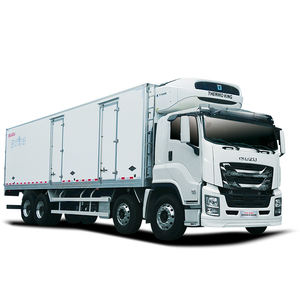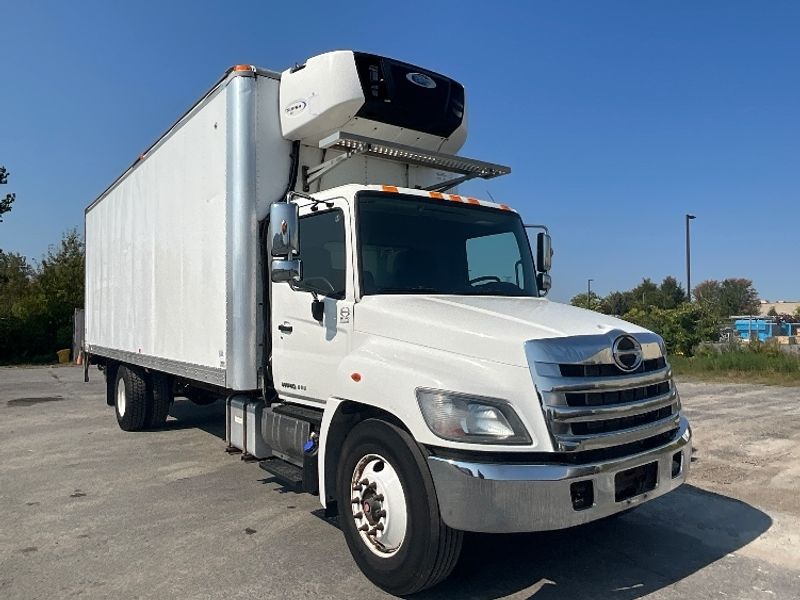Top Developments in Transport Refrigeration: Enhancing Effectiveness and Security
The landscape of transport refrigeration is undertaking considerable transformation, driven by advancements intended at enhancing both effectiveness and safety. As these advancements proceed to develop, it is crucial to explore their ramifications on functional techniques and regulatory compliance, motivating a closer assessment of just how they improve the future of transport refrigeration.
Smart Temperature Level Keeping An Eye On Systems
In the world of transport refrigeration, smart temperature tracking systems have actually become a crucial development for making certain the integrity of temperature-sensitive goods. These sophisticated systems take advantage of Net of Points (IoT) technology to supply real-time information on temperature level variations, enabling operators to maintain optimal conditions throughout the supply chain. By constantly tracking the temperature level of chilled containers and vehicles, business can quickly recognize discrepancies that might endanger item quality.

Moreover, smart surveillance systems typically integrate automated notifies and alerts, enabling stakeholders to respond immediately to any possible issues. This positive technique not only reduces the threat of spoilage however additionally enhances conformity with governing standards regulating food safety and security and pharmaceutical transport.
The integration of information analytics within these systems additionally facilitates predictive upkeep, assisting drivers to predict potential devices failings prior to they occur. This capacity reduces downtime and optimizes operational effectiveness, inevitably bring about set you back savings.
Eco-Friendly Refrigerants
Smart temperature level monitoring systems play a crucial role in keeping item high quality, however the effectiveness of transport refrigeration also rests on the choice of refrigerants made use of. As environmental worries rise, the shift in the direction of environmentally friendly cooling agents has ended up being critical. Conventional cooling agents, such as hydrofluorocarbons (HFCs), are notorious for their high Worldwide Warming Possible (GWP), adding considerably to environment adjustment. On the other hand, arising choices like hydrocarbon-based refrigerants and hydrofluoroolefins (HFOs) present reduced GWP alternatives, offering both effectiveness and sustainability.
These environmentally friendly cooling agents not just minimize ecological influence yet also line up with international policies targeted at terminating damaging substances. Their adoption can result in improved power performance, ultimately decreasing operating prices for transportation refrigeration systems. Additionally, the usage of natural refrigerants, such as ammonia and carbon dioxide, has actually obtained grip because of their exceptional thermodynamic homes and lower ecological impact.
Investing in environment-friendly cooling agents is not simply a regulatory conformity procedure; it represents a strategic choice that improves brand online reputation and promotes customer commitment. refrigerated transportation thermo king. By prioritizing lasting methods, companies can add to a greener future while guaranteeing the honesty of moved products
Advanced Insulation Products
Making use of sophisticated insulation materials is critical for maximizing transport refrigeration systems, as they dramatically improve energy effectiveness and maintain regular temperature control. Traditional insulation techniques typically drop short in preventing thermal transfer, bring about increased power consumption and rising and fall temperatures within chilled compartments.
Emerging products such as vacuum shielded panels (VIPs) and aerogels offer premium thermal resistance, enabling thinner accounts without compromising efficiency. VIPs, for instance, use a vacuum cleaner layer to reduce conductive and convective warmth transfer, making them excellent for space-constrained applications. Aerogels, understood for their porous and light-weight structure, offer phenomenal insulation while significantly lowering general system weight.
Furthermore, integrating stage adjustment products (PCMs) into insulation systems can even more support temperature levels throughout transportation. These products soak up and release thermal energy, efficiently buffering versus exterior temperature level variations.
The combination of these advanced insulation materials not just reduces the functional costs connected with power consumption but also extends the shelf life of temperature-sensitive goods. basics As the transport refrigeration industry remains to develop, the adoption of innovative insulation innovations will be critical in improving both efficiency and safety in refrigerated transport.
Automated Route Optimization
The performance of transportation refrigeration systems is significantly improved with automated course optimization, which leverages innovative formulas and real-time information to figure out one of the most reliable courses for delivery. By analyzing different aspects such as web traffic patterns, climate problems, and distribution windows, these systems can considerably minimize traveling time and gas usage.
Automated course optimization minimizes human mistake and subjective decision-making, which can lead to ineffectiveness. This innovation allows fleet supervisors to designate resources better, guaranteeing that chilled items preserve their required temperature level throughout the trip. By enhancing routes, companies can also boost client complete satisfaction with prompt distributions.
In addition, automated systems can adapt to unforeseen conditions, such as road closures or sudden web traffic spikes, allowing for vibrant rerouting. This flexibility not just protects the honesty of temperature-sensitive products however also adds to overall functional efficiency.
Carrying out automated route optimization can cause considerable cost financial savings while decreasing the carbon footprint connected with transportation. As services progressively prioritize sustainability, this technology sticks out as an essential element in modern-day transportation refrigeration, aligning operational objectives with ecological responsibility. Ultimately, automated path optimization stands for a substantial development in the pursuit for efficiency and safety in transport refrigeration.

Real-Time Data Analytics
Automated path optimization substantially advantages from the assimilation of real-time data analytics, which provides vital insights right into the performance of transportation refrigeration systems. By utilizing real-time information, transportation operators can check temperature fluctuations and tools performance, ensuring that subject to spoiling products are maintained within called for specifications throughout transit. This proactive technique not only enhances the quality of the transported items but linked here likewise mitigates the threat of putridity and loss.

Along with enhancing efficiency, real-time analytics improves safety and security by guaranteeing conformity with regulative standards for temperature level control. redirected here This not only protects public wellness however also strengthens a business's track record - thermo king truck refrigeration. As the transport refrigeration market develops, the assimilation of real-time data analytics becomes a foundation for driving development, sustainability, and operational excellence
Conclusion
In verdict, the developments in transportation refrigeration significantly improve both efficiency and safety and security within the industry. Collectively, these technologies stand for a crucial development in transportation refrigeration, making certain conformity with governing standards and promoting a greener future.
The landscape of transport refrigeration is undertaking significant improvement, driven by technologies intended at enhancing both efficiency and safety.Smart temperature tracking systems play a crucial function in preserving product high quality, however the efficiency of transport refrigeration additionally pivots on the choice of refrigerants used. Their adoption can lead to enhanced energy performance, ultimately minimizing operating expenses for transport refrigeration systems. Inevitably, automated route optimization represents a considerable improvement in the mission for efficiency and safety in transportation refrigeration.
In final thought, the improvements in transport refrigeration significantly boost both effectiveness and safety and security within the market.
Comments on “Thermo King Transport Refrigeration: Top Quality Air Conditioning for Freight”